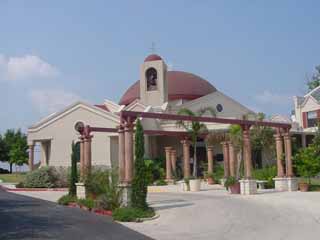50 Watts of Freedom
By Chris Womack, Fri., Sept. 27, 2002

Radio activist Pete Tridish of Philadelphia's Prometheus Radio Project has been traveling across the southern U.S., hoping to spread the free-radio gospel by helping community groups take advantage of the Federal Communication Commission's new Low Power FM license. While typical commercial stations use 10,000 watts or more, LPFM stations broadcast at a power of only 50 to 100 watts. At a recent appearance at MonkeyWrench Books on North Loop, Tridish spoke with LPFM applicants and local radio activists -- many of them former "pirate" broadcasters -- about the history of LPFM, radio technicalities, and the kind of stations Prometheus hopes will emerge with the new licenses.
When Congress passed the Telecommunications Act of 1996, nationwide radio station ownership limits were removed and local limits relaxed. A buying frenzy ensued, creating mammoth companies owning hundreds of stations. In response, a large number of unlicensed low-power "pirate" stations were created all over the U.S. by activists arguing that their actions were justified by corporate consolidation. Prometheus was founded as a pirate radio support organization, and Tridish says, "We pledged to put 10 stations on the air for every one the FCC shut down." Among these upstart stations were the now-defunct Austin pirates Radio One, Free Radio Austin, and Rabble Radio, as well as KIND Radio of San Marcos, which still exists but has been ordered to stay off the air while a judge considers the station's legal arguments for continuation.
In early 2000, the FCC voted to create a license that would allow -- and legitimize -- low-power noncommercial stations similar to the pirate stations. The activists believe they have effectively forced the FCC into creating the LPFM license as a bureaucratic fig leaf, because none had existed before unlicensed stations claimed space on the dial as a free-speech right. Yet a rider to the 2001 appropriations bill currently mandates greater frequency space between LPFM stations and existing stations than is required for full-power broadcasters. Tridish says that in using the licensing system, Prometheus' role has become "to perform a little triage, to get as many good people through the process as possible." They are also hoping to defend the frequencies against further homogenization: Prometheus discovered numerous California applications from a group called Calvary Church, which they fear will rebroadcast the same programming on each station. "We filed 65 petitions to deny," Tridish said.
During a June 2001 Texas LPFM license application period, nine applications were filed for licenses in or near Austin. Bastrop, Dripping Springs, Austin, and Fredericksburg each had one applicant, while San Marcos had five applications for the same frequency. Only one application has been successful so far: On Aug. 7, the FCC granted an LPFM construction permit to Dripping Springs' Principle Broadcasting Foundation Inc. for the frequency 99.9 FM. Foundation President Phillip Sandifer, a music writer/producer and self-described radio geek, says it will take three months to have the station dousing Dripping Springs with 50 watts of "various splinter groups, high school students interested in broadcasting," and anyone else interested in community programming. Of the big station owners and the FCC, Sandifer says, "It seems like they're trying to do every neat, cool, fun thing except what radio was intended for in the first place -- which is provide a voice."
Steve Maus and his son Brian came to Tridish's workshop to meet other radio activists and to talk about the equipment they'll need if the FCC grants the application filed by the Bastrop County Environmental Network for the 99.7 frequency. Maus hopes the high school kids and community groups they plan to put on the air will infuse radio with some variety. "The state of radio is just getting worse by the year," he says. The National Lawyers Guild Committee on Democratic Communications paid for one hour of an engineer's time to help out with the technical details of BCEN's application -- now they wait for the slow grinding of the FCC official wheels.
The lone Austin LPFM application -- submitted to the FCC by Our Lady's Maronite Catholic Church on East 51st Street -- apparently doesn't stand a chance. There simply isn't enough space on the local dial for the new stations under Congress' spacing requirements, which will force the LPFMs to use the fourth adjacent frequency from any other broadcaster -- meaning, a station that wants to set up at 99.9 could only do so as long as there is no other station closer than 99.1 or 100.7. (Commercial stations are limited to third adjacent, and can apply for a waiver to use second adjacent.) That's why Tridish and some of the folks at his workshop still like pirates. "I think they're just as legitimate as they always were -- as long as there are people that don't have a community radio station."
Got something to say on the subject? Send a letter to the editor.






